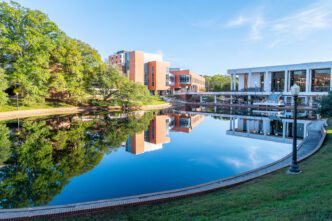The Association of Public and Land-grant Universities (APLU) has named Clemson University one of six finalists for the 2025 Innovation & Economic Prosperity (IEP) Awards, which honor institutions making significant contributions to talent development, innovation, and community engagement. Winners will be announced during APLU’s annual meeting in November.
Clemson is recognized for initiatives that fuel South Carolina’s economic growth and extend impact nationally through innovative partnerships with industry and communities. These include the Clemson University International Center for Automotive Research (CU-ICAR), which anchors a thriving mobility and advanced manufacturing ecosystem in Greenville; the Center for Human Genetics in Greenwood, which advances biomedical discovery and strengthens the life sciences industry; and the Brook T. Smith Launchpad, which has quickly become a hub for entrepreneurial activity on Clemson’s main campus.
The finalists – the University of California, Los Angeles, Clemson University, University of Georgia, University of Maryland, University of Tennessee, Knoxville, and West Virginia University – are competing for different awards that recognize exemplary and innovative case studies of economic engagement impact:
- The IEP Talent Award, recognizing exemplary initiatives in education and workforce development.
- The IEP Place Award, recognizing exemplary initiatives resulting in social, cultural, or community development.
- The IEP Innovation Award, recognizing exemplary initiatives spurring innovation, entrepreneurship, and technology-based economic development.
All universities are finalists for the IEP Economic Engagement Connections Award, which is the top prize in the awards competition, recognizing overall excellence across all three award categories.
To be eligible, institutions must first earn APLU’s IEP designation, requiring a rigorous self-study and external stakeholder engagement process to assess and improve economic engagement activities. Clemson earned the designation in 2015 and was awarded a five-year extension in 2024.







